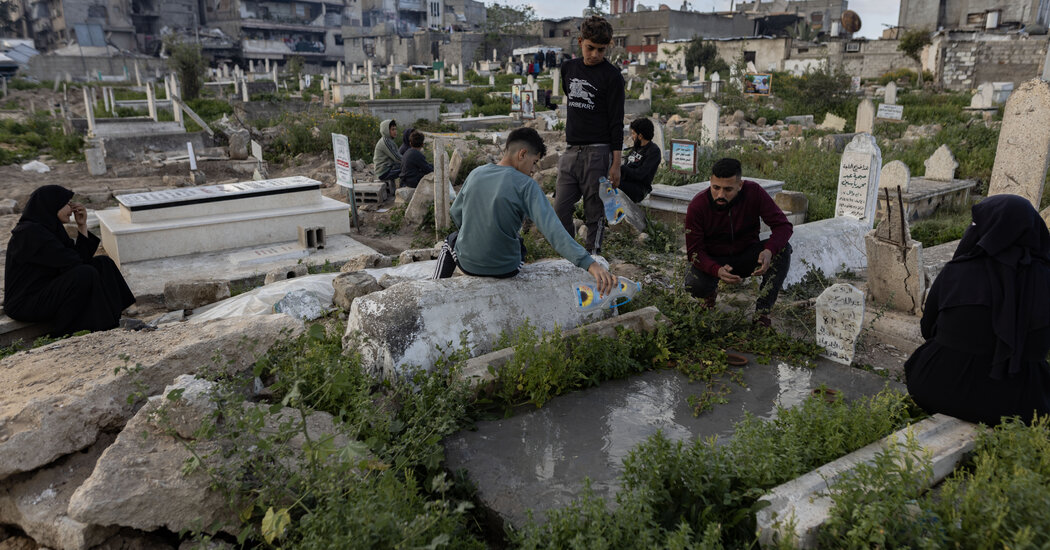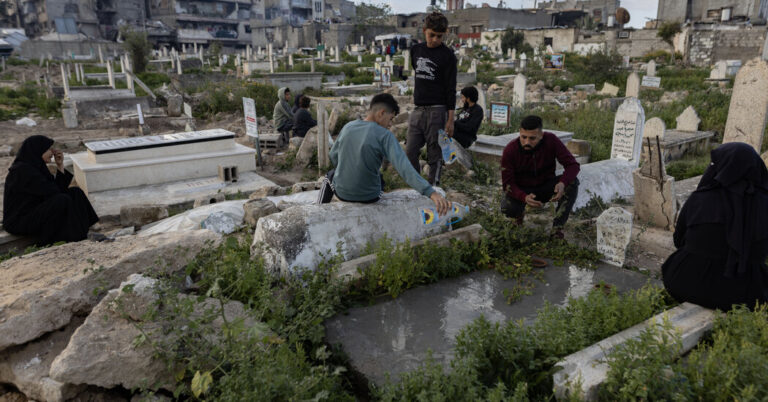Israel and Hamas both reported the efforts for a renewed one ceased in Gaza, less than two weeks after the breakdown of a temporary respite and the resumption of the air campaign and land of Israel against the militant group in the enclave were underway.
Hamas said on Saturday that he had accepted a proposal for a new ceased the fire, which would have seen some hostages released by imprisonment in Gaza. Israel also said that he had received a proposal through third -party mediators and had responded with a counter -proposal in coordination with the United States.
“Military pressure is working,” Prime Minister Benjamin Netanyahu of Israel said on Sunday in observations at the beginning of his weekly cabinet meeting, adding that Israel “suddenly saw cracks” in Hamas’ position.
Since Israel resumed attacks on the Gaza Strip on March 18, over 900 people have been killed, he said the Ministry of Health of the Enclave on Saturday. The Ministry does not distinguish between civil and fighters.
None of the parties published the details of the proposal or the counter -proposal, but an informed officer on the interviews suggested that they widely echoed the previous proposals floated in the last few weeks. Although there was no indication that a turning point was imminent, public declarations suggested that after weeks of unnecessary negotiations, contacts for an agreement were also proceeding when the war continued.
On Sunday, Palestine Red Crescent Society has declared that it has recovered the bodies of eight emergency medical technicians, five civil defense staff and an employee of the United Nations in Rafah in the south of Gaza. The medical organization said he had lost contact with nine crew members more than a week ago after being fired directly by Israeli forces. The Israeli army did not immediately respond to a commentary request.
What did Hamas say?
Khalil Al-Hayya, a high official and negotiator of Hamas, declared in a Saturday speech that his group had received a proposal two days earlier from the Egyptian mediators and the Qatar for a renewed ceased the fire, adding that Hamas had “replied positively and approved”.
He did not detailed the terms, but the recent negotiations, including an unusual tour of direct interviews between Us and Hamas, had focused on the guarantee of the release of Edan Alexander, the only Israeli American hostage still believed to be alive, as well as the bodies of four other Israeli Americans.
That was a non-start for Israel, who had requested the release of 10 or 11 living hostages for a seven weeks of the ceased temporary fire, based on a previous proposal attributed to the important envoy of the Middle East of the White House, Steve Witkoff.
What did Israel say?
After Signor Al-Hayya’s speech on Saturday, Netanyahu said he had held a series of consultations on Friday after receiving the proposal, according to a declaration of his office. Israel had sent a counter -proposal to the mediators a few hours earlier, added the declaration.
The official informed on the interviews, which was speaking on condition of anonymity to discuss the delicate diplomacy, said that Israel has still sought the release of 10 living hostages for any recovery of the ceasefire and that Egypt was the basis of the last proposals.
Up to 24 living hostages in Gaza, according to Israel, together with the remains of 35 other people. They were among the approximately 250 people captured during the mortal attack led by Hamas to Israel in October 2023 who lit the war.
What are the main attack points?
In addition to agreeing on the number of hostages and Palestinian prisoners to be released, any renewed ceased the fire will probably have elusive as long as the two parties remain in contrast with more fundamental issues, including irreconcilable requests on the future of Gaza.
Al-Hayya said that Hamas has committed himself to reaching an agreement that would have guaranteed a ceased fire and the complete withdrawal of Israeli forces from the Gaza Strip, general terms that the parties had already agreed to extend the trout that in the end collapsed.
“We don’t want anything new,” said Al-Hayya on Saturday. “We want to respect what has been signed, what the guarantees have guaranteed and what the international community has approved”.
Israel has conditioned the end of the war in Hamas who settles his arms and renounces Gaza. Al-Hayya said that the group’s “resistance weapons” were a “red line” as long as Israel occupies Palestinian land.
What has changed?
Israel and Hamas have blamed the other for the collapse of the first phase of the ceased the fire which entered into force in mid -January.
But both are now aimed at intense pressure to renew the truce.
When the first phase of the ceased the fire expired at the beginning of March, Israel stopped the entry of all commercial assets and humanitarian aid to Gaza, worsening the conditions for a population already exhausted in an attempt to force Hamas to accept a temporary extension of the fire instead of negotiating a permanent one.
More than 50,000 Gaza have been killed so far in war, according to the Ministry of Health of Gaza, And most of the enclave is in ruins.
Since then the protests have broken out against Hamas in Gaza. An activist in the protest movement said he was worried that Hamas can accept another ceased temporary fire so that his security forces can get out of the hiding place and repress the protesters without fear of being attacked by Israel.
Mr. Netanyahu was also under home pressure. Many Israelis have accused him of not giving priority to the hostages and of prolonging the war in Gaza to keep the far -right members of his coalition in power on board to guarantee his political survival.
“We commit to bringing the hostages home,” said Netanyahu on Sunday, rejecting popular criticisms. “The combination of military pressure and diplomatic pressure is the only thing that will report the hostages,” he added.





